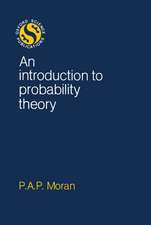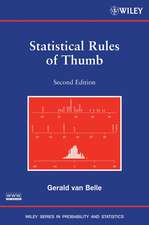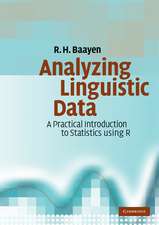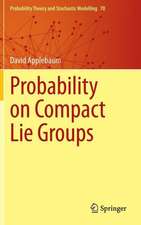Queues and Lévy Fluctuation Theory: Universitext
Autor Krzysztof Dębicki, Michel Mandjesen Limba Engleză Paperback – 14 aug 2015
Queues and Lévy Fluctuation Theory will appeal to postgraduate students and researchers in mathematics, computer science, and electrical engineering. Basic prerequisites are probability theory and stochastic processes.
Din seria Universitext
- 13%
 Preț: 353.49 lei
Preț: 353.49 lei -
 Preț: 487.96 lei
Preț: 487.96 lei - 15%
 Preț: 543.75 lei
Preț: 543.75 lei -
 Preț: 418.67 lei
Preț: 418.67 lei - 20%
 Preț: 628.22 lei
Preț: 628.22 lei -
 Preț: 322.62 lei
Preț: 322.62 lei - 17%
 Preț: 364.82 lei
Preț: 364.82 lei -
 Preț: 634.38 lei
Preț: 634.38 lei - 17%
 Preț: 427.32 lei
Preț: 427.32 lei - 13%
 Preț: 355.52 lei
Preț: 355.52 lei - 17%
 Preț: 431.50 lei
Preț: 431.50 lei - 19%
 Preț: 429.21 lei
Preț: 429.21 lei - 19%
 Preț: 393.95 lei
Preț: 393.95 lei -
 Preț: 360.08 lei
Preț: 360.08 lei -
 Preț: 358.44 lei
Preț: 358.44 lei - 13%
 Preț: 389.95 lei
Preț: 389.95 lei -
 Preț: 465.61 lei
Preț: 465.61 lei -
 Preț: 371.99 lei
Preț: 371.99 lei - 15%
 Preț: 497.22 lei
Preț: 497.22 lei - 15%
 Preț: 737.46 lei
Preț: 737.46 lei - 17%
 Preț: 394.41 lei
Preț: 394.41 lei - 15%
 Preț: 509.58 lei
Preț: 509.58 lei - 17%
 Preț: 427.68 lei
Preț: 427.68 lei - 8%
 Preț: 495.44 lei
Preț: 495.44 lei - 17%
 Preț: 364.57 lei
Preț: 364.57 lei - 17%
 Preț: 369.08 lei
Preț: 369.08 lei -
 Preț: 396.55 lei
Preț: 396.55 lei - 15%
 Preț: 553.33 lei
Preț: 553.33 lei - 17%
 Preț: 365.35 lei
Preț: 365.35 lei -
 Preț: 356.78 lei
Preț: 356.78 lei -
 Preț: 673.45 lei
Preț: 673.45 lei - 17%
 Preț: 426.76 lei
Preț: 426.76 lei - 20%
 Preț: 569.56 lei
Preț: 569.56 lei -
 Preț: 372.87 lei
Preț: 372.87 lei -
 Preț: 319.07 lei
Preț: 319.07 lei -
 Preț: 379.86 lei
Preț: 379.86 lei -
 Preț: 445.88 lei
Preț: 445.88 lei -
 Preț: 382.36 lei
Preț: 382.36 lei - 15%
 Preț: 533.72 lei
Preț: 533.72 lei - 15%
 Preț: 496.02 lei
Preț: 496.02 lei - 15%
 Preț: 474.82 lei
Preț: 474.82 lei -
 Preț: 389.70 lei
Preț: 389.70 lei -
 Preț: 484.08 lei
Preț: 484.08 lei - 15%
 Preț: 643.48 lei
Preț: 643.48 lei -
 Preț: 415.02 lei
Preț: 415.02 lei - 15%
 Preț: 602.25 lei
Preț: 602.25 lei - 20%
 Preț: 510.24 lei
Preț: 510.24 lei - 15%
 Preț: 588.37 lei
Preț: 588.37 lei -
 Preț: 381.59 lei
Preț: 381.59 lei
Preț: 419.81 lei
Nou
Puncte Express: 630
Preț estimativ în valută:
80.34€ • 87.24$ • 67.49£
80.34€ • 87.24$ • 67.49£
Carte tipărită la comandă
Livrare economică 23 aprilie-07 mai
Preluare comenzi: 021 569.72.76
Specificații
ISBN-13: 9783319206929
ISBN-10: 3319206923
Pagini: 276
Ilustrații: XI, 255 p. 12 illus.
Dimensiuni: 155 x 235 x 17 mm
Greutate: 0.38 kg
Ediția:1st ed. 2015
Editura: Springer International Publishing
Colecția Springer
Seria Universitext
Locul publicării:Cham, Switzerland
ISBN-10: 3319206923
Pagini: 276
Ilustrații: XI, 255 p. 12 illus.
Dimensiuni: 155 x 235 x 17 mm
Greutate: 0.38 kg
Ediția:1st ed. 2015
Editura: Springer International Publishing
Colecția Springer
Seria Universitext
Locul publicării:Cham, Switzerland
Public țintă
GraduateCuprins
Introduction.- Lévy processes and Lévy-driven queues.- Steady-state workload.- Transient workload.- Heavy traffic.- Busy period.- Workload correlation function.- Stationary workload asymptotics.- Transient asymptotics.- Simulation of Lévy-driven queues.- Variants of the standard queue.- Lévy-driven tandem queues.- Lévy-driven queueing networks.- Applications in communication networks.- Applications in mathematical finance.- Computational aspects: inversion techniques.- Concluding remarks.- Bibliography.
Recenzii
“The book presents, often in summary fashion, virtually all of the known results on Lévy-driven queues, quite a few of them obtained by the authors of this book, and thus it is ideal for a researcher who would like to enter this area. … I found the sketchy treatment of many results extremely useful and motivating. The list of references is complete, and a small number of useful exercises are included at the end of each chapter.” (Michael A. Zazanis, Mathematical Reviews, May, 2017)
Notă biografică
Krzysztof Dębicki is a professor at the University of Wrocław, Poland. His research interests lie in extreme value analysis of stochastic processes and their applications in risk and queueing theory. His work is focused on extremes and boundary crossing probabilities of Gaussian and Lévy processes, limit theorems and stochastic networks. He serves as an associate editor of Queueing Systems and Probability and Mathematical Statistics.
Michel Mandjes is a professor at the University of Amsterdam, the Netherlands; he is also part-time with Eurandom and CWI; he previously worked at Bell Labs (Murray Hill), and had a sabbatical at Stanford. His research focuses on queueing theory and stochastic process analysis, with operations-research-type applications. He is author of the book Large Deviations for Gaussian Queues. He serves as an associate editor of Queueing Systems, Stochastic Systems, Stochastic Models, and Advances in Applied Probability / Journal of Applied Probability.
Michel Mandjes is a professor at the University of Amsterdam, the Netherlands; he is also part-time with Eurandom and CWI; he previously worked at Bell Labs (Murray Hill), and had a sabbatical at Stanford. His research focuses on queueing theory and stochastic process analysis, with operations-research-type applications. He is author of the book Large Deviations for Gaussian Queues. He serves as an associate editor of Queueing Systems, Stochastic Systems, Stochastic Models, and Advances in Applied Probability / Journal of Applied Probability.
Textul de pe ultima copertă
The book provides an extensive introduction to queueing models driven by Lévy-processes as well as a systematic account of the literature on Lévy-driven queues. The objective is to make the reader familiar with the wide set of probabilistic techniques that have been developed over the past decades, including transform-based techniques, martingales, rate-conservation arguments, change-of-measure, importance sampling, and large deviations. On the application side, it demonstrates how Lévy traffic models arise when modelling current queueing-type systems (as communication networks) and includes applications to finance.
Queues and Lévy Fluctuation Theory will appeal to graduate/postgraduate students and researchers in mathematics, computer science, and electrical engineering. Basic prerequisites are probability theory and stochastic processes.
Queues and Lévy Fluctuation Theory will appeal to graduate/postgraduate students and researchers in mathematics, computer science, and electrical engineering. Basic prerequisites are probability theory and stochastic processes.
Caracteristici
Combines Lévy-based fluctuation theory and queueing theory Studies the possibilities of fluctuation-theoretic elements and the connection to queues Applicable for both an applied- and a theory-oriented audience Includes supplementary material: sn.pub/extras
















